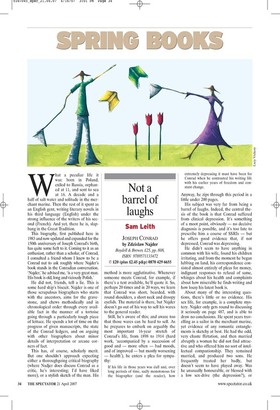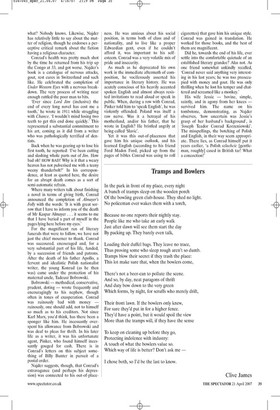Not a barrel of laughs
Sam Leith
JOSEPH CONRAD by Zdzislaw Najder Boydell & Brewer, £25, pp. 808, ISBN 9789571133472 ✆ £20 (plus £2.45 p&p) 0870 429 6655 What a peculiar life it was: born in Poland, exiled to Russia, orphaned at 11, and sent to sea at 16. A decade and a half of salt water and solitude in the merchant marine. Then the rest of it spent as an English gent, writing literary novels in his third language (English) under the strong influence of the writers of his second (French). And yet, there he is, slapbang in the Great Tradition.
This biography, first published here in 1983 and now updated and expanded for the 150th anniversary of Joseph Conrad’s birth, has quite some heft to it. Coming to it as an enthusiast, rather than a scholar, of Conrad, I consulted a friend whom I knew to be a Conrad nut to ask roughly where Najder’s book stands in the Conradian conversation. ‘Najder,’ he advised me, ‘is a very great man. His book is old, long and viciously Polish.’ He did not, friends, tell a lie. This is some hard ship’s biscuit. Najder is one of those scrupulous biographers who starts with the ancestors, aims for the gravestone, and chews methodically and in chronological order through every available fact in the manner of a tortoise going through a particularly tough piece of lettuce. He spends a lot of time on the progress of given manuscripts, the state of the Conrad ledgers, and on arguing with other biographers about minor details of interpretation or arcane corners of fact.
This has, of course, scholarly merit. But one shouldn’t approach expecting either a thoroughgoing critical biography (where Nadjer does discuss Conrad as a critic, he’s interesting; I’d have liked more), or a stylish sketch of the man. His method is more agglutinative. Whenever someone meets Conrad, for example, if there’s a text available, he’ll quote it. So, perhaps 20 times and in 20 ways, we learn that Conrad was short, bearded, with round shoulders, a short neck and droopy eyelids. The material is there, but Najder doesn’t go out of his way to sell his wares to the general reader.
Still, he’s aware of this; and aware too that those wares can be hard to sell. As he prepares to embark on arguably the most important 16-year stretch of Conrad’s life, from 1898 to 1914 (hard work, ‘accompanied by a succession of good and — more often — bad moods, and of improved — but mostly worsening — health’), he enters a plea for sympathy:
If his life in those years was dull and, over long periods of time, sadly monotonous for the biographer (and the reader), how extremely depressing it must have been for Conrad when he contrasted his writing life with his earlier years of freedom and constant change.
Anyway, he zips through this period in a little under 200 pages.
His subject was very far from being a barrel of laughs. Indeed, the central thesis of the book is that Conrad suffered from clinical depression. It’s something of a moot point, obviously — no decisive diagnosis is possible, and it’s too late to prescribe him a course of SSRIs — but he offers good evidence that, if not depressed, Conrad was depressing.
He didn’t seem to have anything in common with his wife, found his children irritating, and from the moment he began lubbing on land, his correspondence consisted almost entirely of pleas for money, indignant responses to refusal of same, whinges about his health and complaints about how miserable he finds writing and how lousy his latest book is.
About many of the interesting questions, there’s little or no evidence. His sex life, for example, is a complete mystery. Najder only gets round to discussing it seriously on page 487, and is able to draw no conclusions. He spent years travelling as a sailor in the merchant marine, yet evidence of any romantic entanglements is sketchy at best. He had the odd, very chaste flirtation, and then married abruptly a woman he did not find attractive and who offered him no sort of intellectual companionship. They remained married, and produced two sons. He frequently treated her badly, but doesn’t seem to have played away. Was he unusually honourable, or blessed with a low sex-drive (the depression?), or what? Nobody knows. Likewise, Najder has relatively little to say about the matter of religion, though he endorses a perceptive critical remark about the fiction having a religious character.
Conrad’s health was pretty much shot by the time he returned from his trip up the Congo at 33, and got worse. Najder’s book is a catalogue of nervous attacks, gout, rest cures in Switzerland and such like. He celebrated the completion of Under Western Eyes with a nervous breakdown. The very process of writing near enough rattled the poor man to bits.
‘Ever since Lord Jim (inclusive) the end of every long novel has cost me a tooth,’ he wrote in 1911 while struggling with Chance. ‘I wouldn’t mind losing two teeth to get this end done quickly.’ This represented a substantial commitment to his art, coming as it did from a writer who was pathologically terrified of dentists.
Back when he was gearing up to lose his first tooth, he reported: ‘I’ve been cutting and slashing whole parts out of Jim. How bad oh! HOW BAD! Why is it that a weary heaven has not pulverised me with a teeny weeny thunderbolt?’ In his correspondence, at least as quoted here, the desire for an abrupt death comes as a sort of semi-automatic refrain.
Where many writers talk about finishing a novel in terms of giving birth, Conrad announced the completion of Almayer’s Folly with the words: ‘It is with great sorrow that I have to inform you of the death of Mr Kaspar Almayer . . . it seems to me that I have buried a part of myself in the pages lying here before my eyes.’ For the magnificent run of literary funerals that were to follow, we have not just the chief mourner to thank. Conrad was succoured, encouraged and, for a very substantial part of his life, funded, by a succession of friends and patrons. After the death of his father Apollo, a fervent and idealistic Polish nationalist writer, the young Konrad (as he then was) came under the protection of his maternal uncle, Tadeusz Bobrowski.
Bobrowski — methodical, conservative, prudent, doting — wrote frequently and encouragingly to his nephew, though often in tones of exasperation. Conrad was ruinously bad with money ruinously, one should add, not to himself so much as to his creditors. Not since Karl Marx, you’d think, has there been a sponger like him. He incessantly overspent his allowance from Bobrowski and was deaf to pleas for thrift. In his later life as a writer, it was his unfortunate agent, Pinker, who found himself incessantly gouged for cash. There is in Conrad’s letters on this subject something of Billy Bunter in pursuit of a postal order.
Najder suggests, though, that Conrad’s extravagance (and perhaps his depression) was connected to his out-of-place ness. He was anxious about his social position, in terms both of class and of nationality, and to live like a proper Edwardian gent, even if he couldn’t afford it, was important to his selfesteem. Conrad was a very volatile mix of pride and insecurity.
As much as he deprecated his own work in the immediate aftermath of composition, he vociferously asserted his importance in literary history. He was acutely conscious of his heavily accented spoken English and almost always resisted invitations to read aloud or speak in public. When, during a row with Conrad, Pinker told him to ‘speak English’, he was violently offended. Poland was itself a raw nerve. Was it a betrayal of his motherland, and/or his father, that he wrote in English? He bristled angrily at being called ‘Slavic’.
Yet it was this out-of-placeness that gave him his unique outlook, and his learned English (according to his friend Ford Madox Ford, picked up from the pages of bibles Conrad was using to roll cigarettes) that gave him his unique style. Conrad was gained in translation. He worked for those books, and the best of them are magnificent.
Did he, towards the end of his life, ever settle into the comfortable quietude of an established literary grandee? Alas not. As one friend somewhat unkindly recalled, ‘Conrad never said anything very interesting in his last years; he was too preoccupied with money and gout. He was only thrilling when he lost his temper and chattered and screamed like a monkey.’ His wife Jessie — bovine, simple, saintly, and in agony from her knees survived him. The name on his tombstone, demonstrating, as Najder observes, ‘how uncertain was Jessie’s grasp of her husband’s background’, is ‘Joseph Teador Conrad Korzeniowski’. The misspellings, the botching of Polish and English, in their way seem appropriate. There lies, as Conrad himself put it years earlier, ‘a Polish szlachcic [gentleman, roughly] cased in British tar! What a concoction!’



















































































 Previous page
Previous page